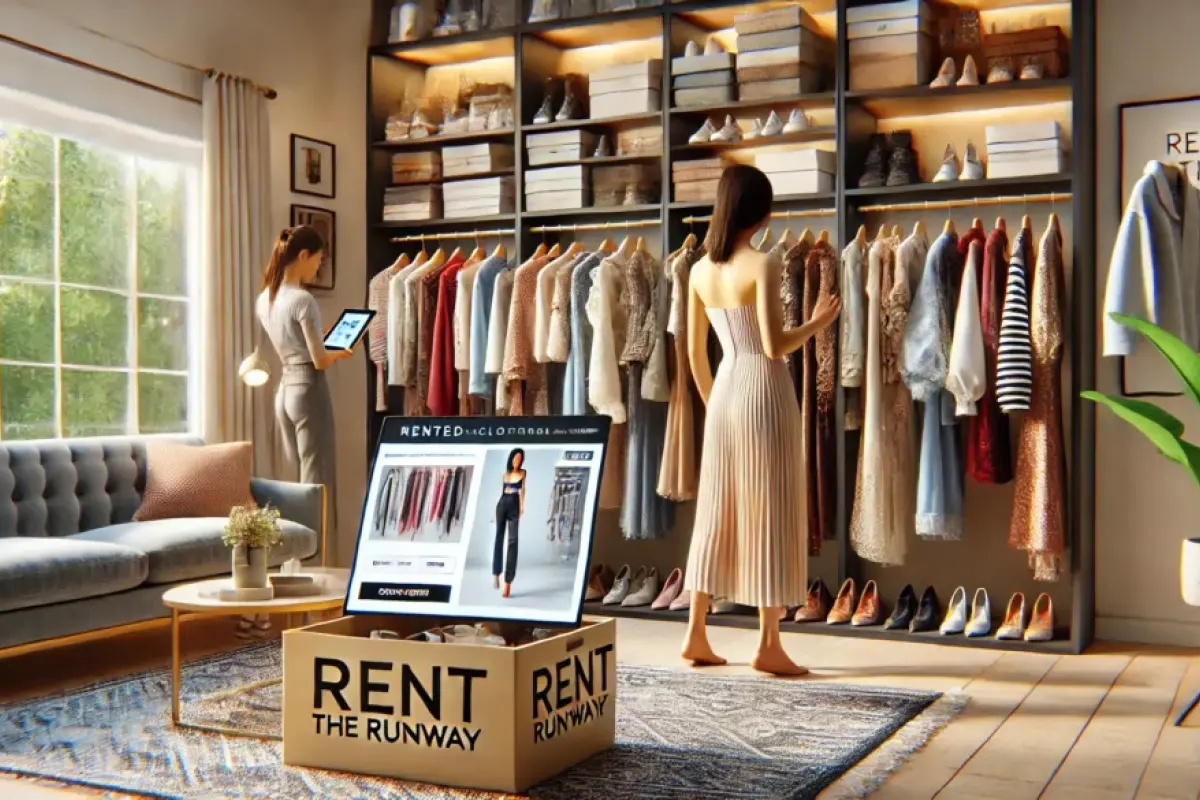
The fashion industry is shifting toward sustainability. Consumers want variety without contributing to waste. Clothing rental services and free trial subscriptions offer a smart, eco-friendly alternative to fast fashion.
These services help people explore personal style while reducing clothing waste. Instead of overloading wardrobes with items they rarely wear, consumers can rotate stylish outfits while minimizing their environmental impact.
Fashion waste is a massive issue, with billions of garments ending up in landfills every year. By adopting rent clothes models, fashion lovers can enjoy an ever-changing wardrobe without contributing to excessive consumption. This shift helps reduce textile waste, lowers carbon footprints, and promotes a circular economy in fashion.
The Appeal of Clothing Rental Services
Fashion lovers no longer need to buy every outfit. Clothing rental services provide access to designer pieces, everyday wear, and even special occasion outfits. Companies like Rent the Runway and Gwynnie Bee offer flexible options.
Customers can rent clothes for a set period and return them when they are done. Some services even allow users to swap items mid-month to maintain variety in their wardrobe without additional purchases (usually it’s a monthly fee subscription).
The benefits are clear:
- Access to high-end brands without high costs
- Freedom to experiment with new trends
- Less closet clutter
- A more sustainable fashion cycle
- Convenient access to a constantly updated wardrobe
- Reduced spending on items worn only once or twice
How Free Trial Clothing Rentals Work
Many services now offer a free trial clothing rental to attract customers. A clothes free trial lets consumers experience rental services before committing. Some allow one rent clothes cycle for free, while others provide discounted rates for the first 30 days. This allows users to determine if the service suits their lifestyle and fashion needs.
Popular platforms offering free trial clothes include:
- Stitch Fix – Offers a style quiz to personalize clothing picks. Stylists curate selections based on individual preferences.
- Gwynnie Bee – Provides a free 30-day trial with unlimited swaps, allowing customers to try multiple styles without risk.
- Rent the Runway – Allows customers to rent items at a time with flexible return policies, ensuring access to designer wear for any occasion.
- Nuuly – A subscription-based rental service that focuses on trendy, contemporary brands.
- Le Tote – Offers personalized rental style boxes for both casual and professional wear.
Clothing Subscription Boxes: A Personalized Fashion Experience
A free trial clothing subscription makes fashion more accessible. Services like clothing subscription boxes curate outfits based on customer preferences. Users fill out a style quiz, and stylists select items that match their personal style.
These rentals provide convenience and variety while cutting down on impulse purchases. They also help consumers experiment with new looks and brands without long-term commitment.
The rise of clothing rental services is transforming the fashion industry by promoting a more eco-friendly and responsible approach to wardrobe management.
Instead of purchasing new outfits for every occasion and eventually discarding them, consumers can now participate in a circular economy where garments are shared, reused, and given an extended life span. This shift not only reduces fashion waste but also decreases the overall environmental impact of clothing production and disposal.
How Clothing Rentals Contribute to Sustainability
One of the primary ways clothing rental services support sustainability is by prolonging the usability of garments. Traditional fashion consumption follows a linear model: garments are produced, purchased, worn, and eventually discarded. Unfortunately, many of these discarded clothes end up in landfills, contributing to the growing problem of textile waste. In contrast, the rental model ensures that a single item is worn multiple times by different individuals, maximizing its utility and delaying its end-of-life stage.
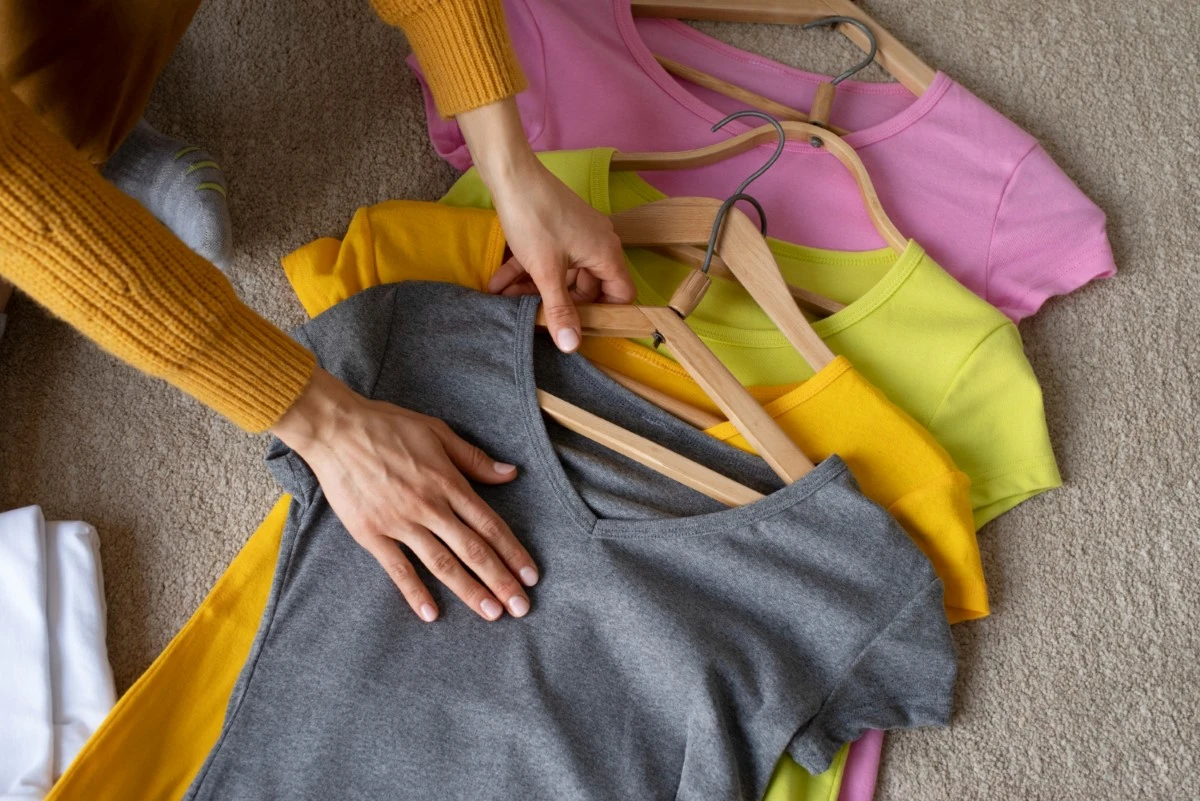
Additionally, most rental platforms take responsibility for maintaining the quality of their garments. They invest in professional cleaning, repair, and refurbishing processes to keep the clothing in excellent condition for each new user. This means that customers receive well-maintained, high-quality pieces without contributing to the excessive demand for new clothing.
Reducing Demand for New Garments
By choosing rentals over new purchases, consumers can directly reduce the need for continuous garment production. This shift has several key environmental benefits:
- Lower Carbon Footprint – The fashion industry is one of the largest contributors to carbon emissions due to energy-intensive manufacturing, transportation, and distribution. By circulating garments within rental platforms, fewer new items need to be produced, leading to lower emissions overall.
- Reduced Resource Depletion – The production of new clothing requires vast amounts of water, energy, and raw materials. Renting minimizes the need for these resources, preserving them for future generations.
- Less Textile Waste – Millions of garments are discarded annually, clogging landfills and taking decades to decompose. Clothing rental services help counteract this issue by keeping garments in use for longer periods.
Encouraging Slow Fashion and Conscious Consumption
The fast fashion industry thrives on rapid turnover and impulsive consumerism, encouraging shoppers to buy frequently and dispose of clothing just as quickly. Clothing rental services promote a different mindset—one that values quality over quantity.
Consumers who rent instead of buy become more mindful of their clothing choices, leading to a culture of slow fashion, where durability and sustainability take precedence over fleeting trends.
Additionally, rental services often provide access to high-end or designer pieces at a fraction of the cost of purchasing them outright. This means that consumers can enjoy premium fashion without the guilt of contributing to excessive waste.
Key Sustainability Benefits of Clothing Rentals
Clothing rental services are a smart and eco-friendly way to enjoy fashion without harming the planet. By choosing to rent instead of buying new clothes all the time, people can help reduce waste, save resources, and make more sustainable choices. Here’s how clothing rentals make a difference:
1. Less Clothing Waste in Landfills
Fast fashion leads to millions of clothes being thrown away every year. Many of these items end up in landfills, where they take years to break down. Some fabrics, like polyester, release tiny plastic particles into the environment, causing pollution.
When people rent clothes, they help keep garments in use for longer. Instead of being worn once and tossed out, rented clothing is shared among multiple users. This reduces the number of clothes that get thrown away and lowers textile waste.
2. Less Waste from Clothing Production
Making new clothes requires cutting fabrics, sewing pieces together, and dyeing textiles. These steps produce a lot of waste, including leftover fabric scraps and harmful chemicals. Factories also often make more clothes than needed, leading to excess stock that might never be sold.
Clothing rentals reduce the need for constant production. If more people rent instead of buy, fewer garments are needed, meaning less waste is created in the manufacturing process.
3. Lower Carbon Footprint
The fashion industry produces a lot of carbon emissions because clothes are made in factories, transported across the world, and stored in warehouses before being sold. This process releases harmful gases that contribute to climate change.
When people rent clothes, fewer new items need to be produced. Since each rented piece is worn by multiple people, it reduces the need for constant production and transportation. This lowers the overall carbon footprint of each garment.
4. Encouraging Smarter Shopping Habits
Fast fashion encourages people to buy cheap, trendy clothes they only wear a few times before discarding them. This cycle leads to overconsumption and unnecessary waste.
Clothing rentals help shift mindsets. Instead of buying and owning too many clothes, people can rent what they need for special occasions or short-term use. This promotes a slow fashion approach, where quality and sustainability matter more than quantity.
5. Making Clothes Last Longer
Many high-quality clothes are wasted because people buy them for a single event and never wear them again. Renting services make sure these garments are used as much as possible. Now you can just rent dress for your special event.
Rental platforms take care of their clothes by cleaning, repairing, and maintaining them. This keeps garments in good condition so they can be worn by multiple people, extending their lifespan and reducing waste.
6. Saving Water and Energy
Making clothes requires a lot of water and energy. For example, it takes around 2,700 liters of water to make just one cotton t-shirt. Producing denim jeans can take up to 7,500 liters—enough drinking water for one person for several years.
By reducing the need for new clothing, rental services help save water and energy. Since fewer clothes are made, less water is used for cotton farming, dyeing, and fabric processing. This helps protect natural resources.
Clothing rental services are a powerful tool in the fight against fashion waste and environmental degradation. By rethinking the way we consume fashion, individuals can contribute to a more sustainable future while still enjoying stylish, high-quality garments. This model not only benefits the planet but also encourages a more thoughtful and intentional approach to personal style.
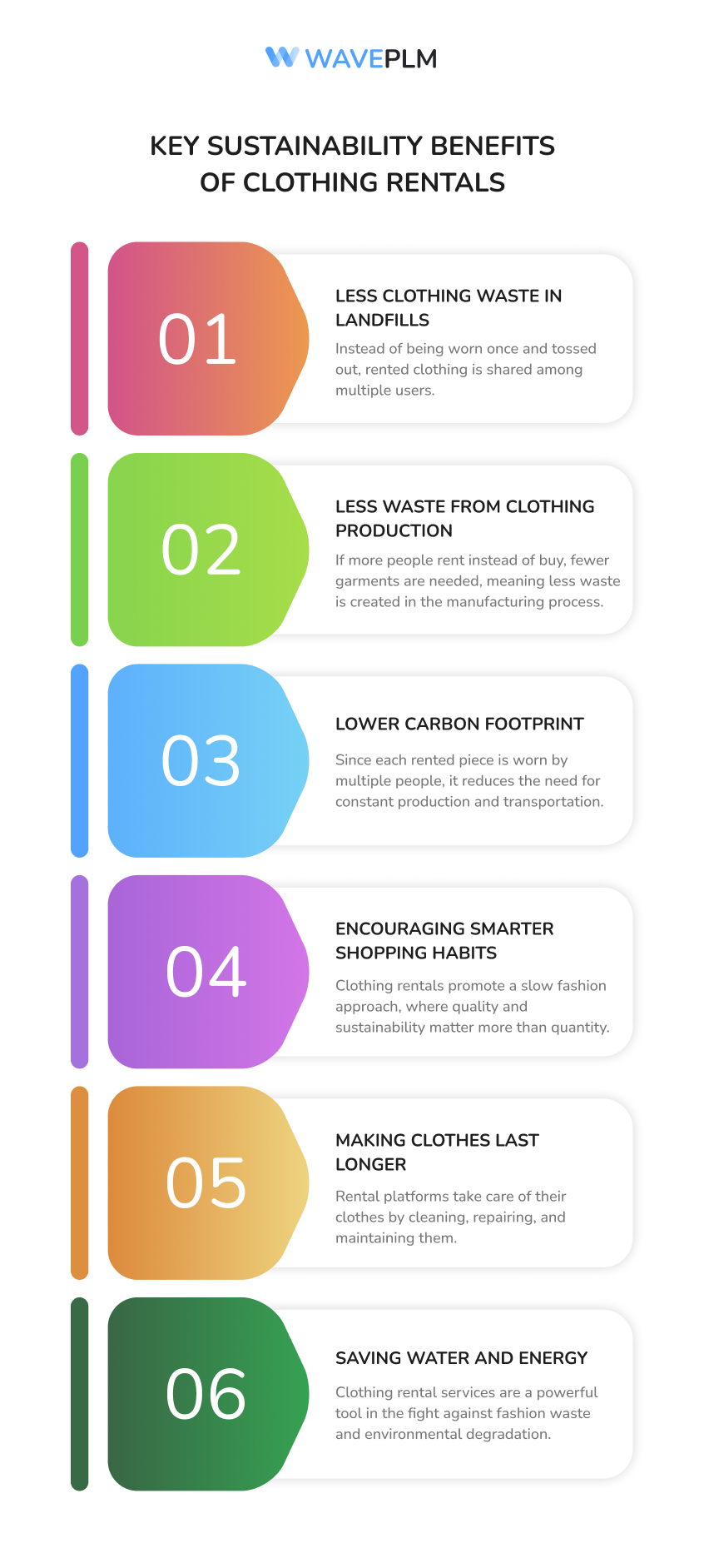
The Role of PLM Software in Sustainable Clothing Rentals
Fashion brands need efficient systems to manage rent clothes activities. Product Lifecycle Management (PLM) software helps companies streamline rental operations. With a robust PLM system, businesses can:
- Track inventory life cycles – Monitor wear and tear, returns, and quality control.
- Optimize rental logistics – Manage subscription orders, shipping, and returns efficiently.
- Ensure sustainability – Maintain high standards in garment care to extend the lifespan of each item.
Inventory management is crucial in the clothing rental industry. Unlike traditional retail, rental businesses must track each clothing item’s usage and condition. PLM software helps brands monitor fabric durability, assess repairs, and determine when garments should be retired or repurposed.
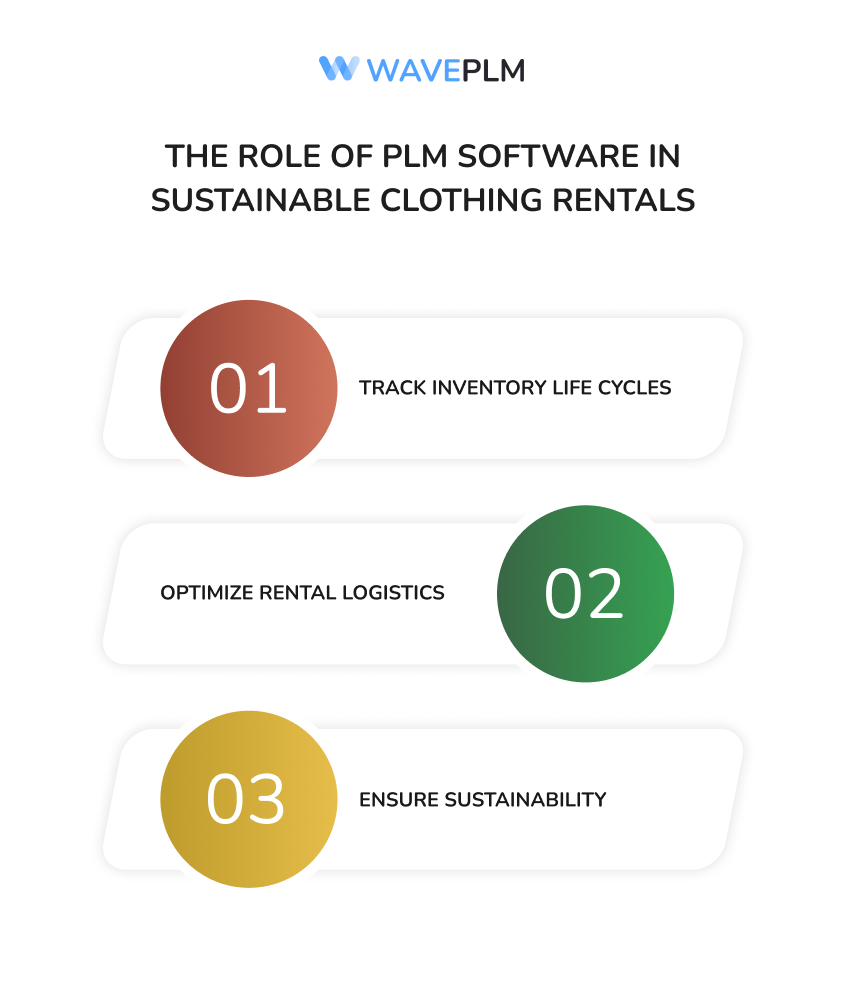
Enhancing Consumer Experience with Technology
Modern clothing rental services use data-driven insights to improve customer satisfaction. By integrating PLM with AI-powered recommendation engines, brands can personalize clothing selections based on a user’s history and preferences.
Additionally, some companies use digital wardrobes or virtual closets that allow users to preview their rental options online before selecting items. This feature enhances convenience and helps consumers make informed fashion choices.
Expanding the Reach of Clothing Rentals
The demand for flexible fashion solutions is growing. More consumers are embracing clothing rentals and free trial clothing subscriptions. With PLM software optimizing these services, the future of fashion looks more sustainable. Brands that adopt these models will reduce waste, meet evolving consumer expectations, and lead the way toward an eco-friendly wardrobe revolution.
Fashion brands are also exploring partnerships with influencers and stylists to make rental services more mainstream. By highlighting sustainable fashion choices, these collaborations help normalize clothing rentals and encourage more people to rethink their shopping habits.
Overcoming Challenges in the Clothing Rental Industry
While clothing rentals are a step toward sustainability, companies face challenges such as:
- Hygiene and garment care: Ensuring high cleanliness standards is crucial. Rental services use advanced cleaning technologies to maintain hygiene and garment quality.
- Logistics and returns: Managing high volumes of exchanges requires efficient logistics solutions. Companies use smart tracking systems and automated return processes to streamline operations.
- Consumer mindset shift: Some shoppers still prefer owning clothing rather than renting. Marketing strategies must highlight the financial and environmental benefits of rentals to encourage adoption.
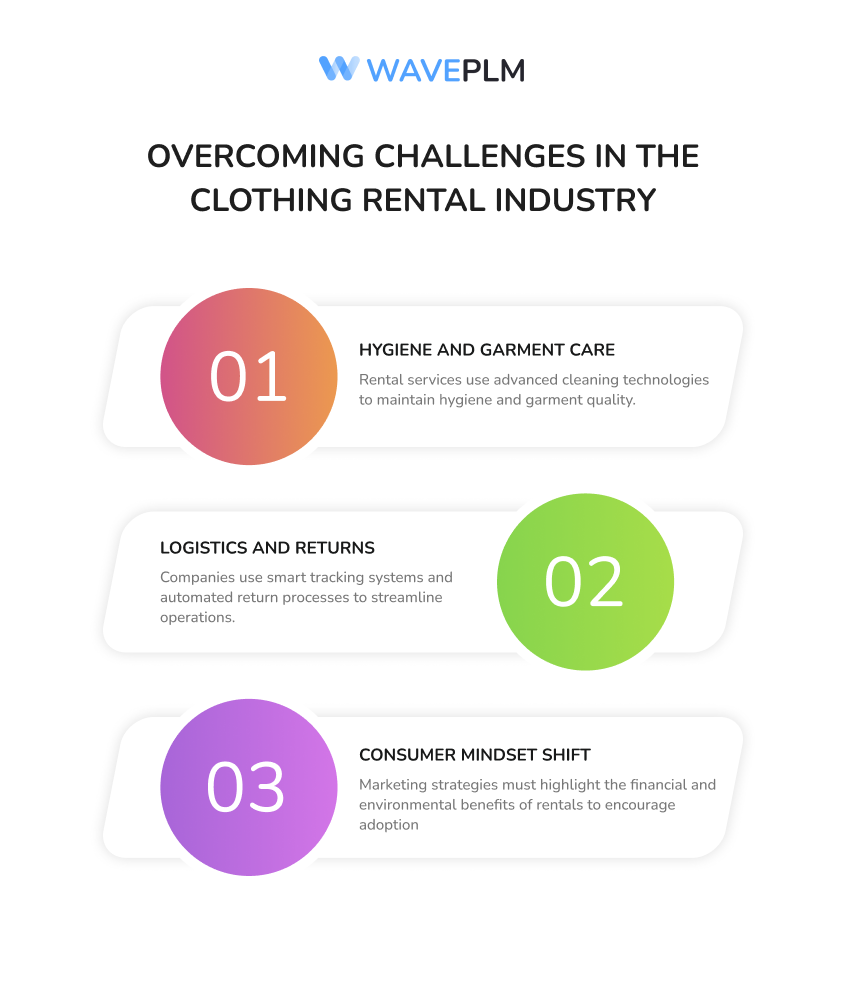
The Future of Sustainable Fashion
The future of fashion is shifting toward circular economies where rental, resale, and recycling play a central role. Clothing rental services contribute to this transformation by extending the lifespan of garments and reducing unnecessary production.
As technology advances, PLM software will play an even more significant role in optimizing rental services. From tracking sustainability metrics to predicting fashion trends, PLM solutions will help brands meet the growing demand for responsible fashion.
Consumers are now more aware of the environmental impact of their choices. With more people opting for rental services and free trial subscriptions, the industry is on track to becoming more sustainable. The combination of rental fashion and PLM-driven innovation ensures that businesses and consumers can enjoy style without compromising the planet’s future.
Final Thoughts
The rise of free trial clothing rentals and clothing subscription boxes proves that fashion can be both exciting and sustainable. Renting clothing allows consumers to explore trends while minimizing their environmental impact. By incorporating PLM software, brands can improve their rental models, ensuring seamless operations and long-lasting customer satisfaction.
The future of fashion lies in circular models that promote reuse rather than waste. As technology advances, PLM tools will play a crucial role in optimizing rental services and supporting a more responsible fashion industry. Consumers seeking an eco-friendly approach to fashion should explore clothing rentals and consider subscription services that align with their style preferences.
Want to stay ahead in the sustainable fashion movement? Explore how Wave PLM helps brands create efficient, eco-friendly rental models, making fashion more accessible and sustainable for everyone.





Leave a Reply